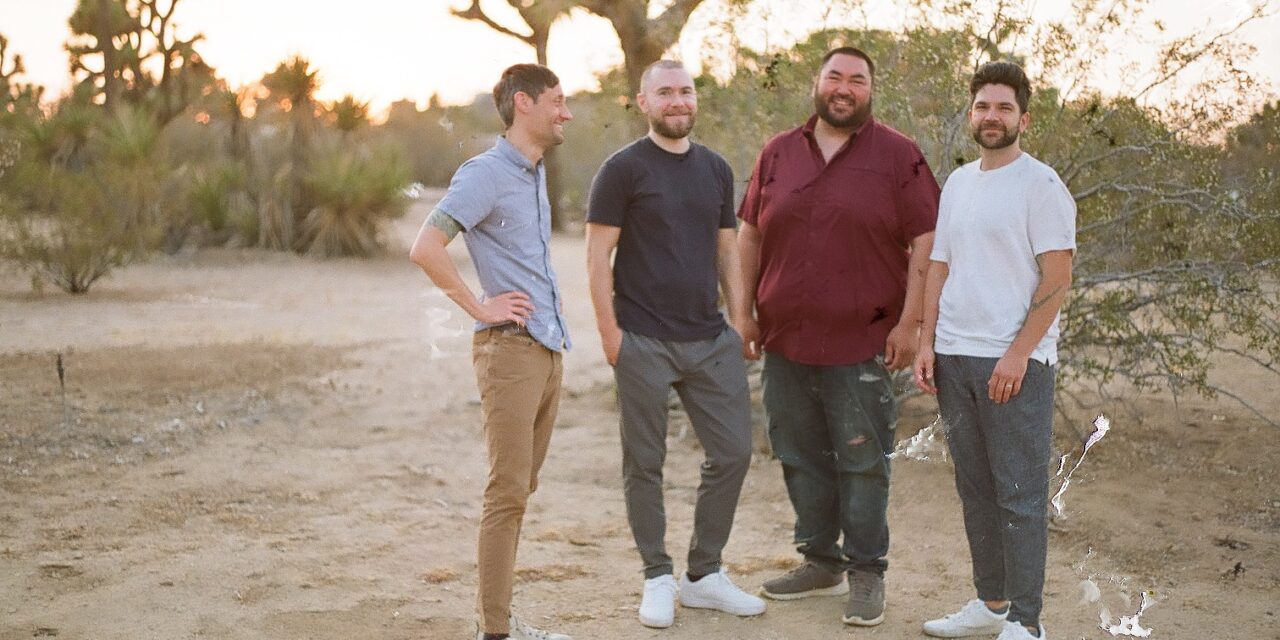Acclaimed indie-pop veterans The Lives of Famous Men return with a striking new release, “No Alarm,” out today on all digital platforms following its premiere at Magnet Magazine. With nods to Death Cab for Cutie, Superchunk, Portastatic, and The Shins, the track marks one of the band’s most politically resonant and emotionally charged moments to date.
For lead singer Daniel Hall, “No Alarm” began as a document of crisis — both personal and systemic.
“I started writing ‘No Alarm’ during the first term,” Hall explains. “I watched my partner go through chemotherapy while a spiteful billionaire tried to strip her and millions of others of their healthcare. Los Angeles was experiencing unseasonal wildfires… Eight years later, the agents of spite and dirty money have clawed away so much from those with so little.”
What unfolds in the song is a vivid reckoning with a world in disarray: climate collapse, political regression, and the emotional toll of pretending things are fine.
“I think we tell ourselves things aren’t as bad as they seem because admitting it would be too overwhelming,” Hall continues. “But maybe it’s time to hit the panic button.”
“No Alarm” channels this tension with a driving beat, sharp lyricism, and the kind of melodic punch that has defined The Lives of Famous Men since their earliest days.
Formed in 2007 and hailing originally from Alaska, LoFM have spent nearly two decades crafting a uniquely cerebral, danceable brand of indie-pop. Now based in Los Angeles, the band’s wide-ranging influences have carried them from MTV’s Campus Invasion Tour to a performance on Jimmy Kimmel Live, where they delivered their standout track “You’re Everyone I Know Right Now.”
Their career has seen collaborations with some of the heaviest hitters in alternative production, including James Paul Wisner (Paramore), Casey Bates (Portugal. The Man), and Paul Q. Kolderie (Radiohead). Their infectious single “Annie Taylor” even became an unexpected club anthem after being remixed by The Angry Kids, while fan-favorite “Orchids” found a second life through its placement in Jennette McCurdy’s short film Strong Independent Women.
After nearly two decades, the band remains as creatively hungry as ever. In 2023, they entered the studio with producer Alex Newport (Bloc Party) to craft their album Greener Pasture Blues, a lush and eclectic project weaving together Motown warmth (“Darling Come Home”), synth-driven dreamscapes (“Yuri”), and razor-sharp guitar anthems (“You and Me in the PRC”).
Their renewed collaboration with Newport this summer brings us to the present moment — and to “No Alarm,” a song that distills the anxieties of the last decade into a tight, electrifying indie-pop flare.
Urgent, incisive, and painfully timely, “No Alarm” is both a warning and a release. Eighteen years into their artistic journey, The Lives of Famous Men continue to prove that their music not only evolves with the times, but speaks directly to them.
Listen to “No Alarm” now on YouTube and all streaming platforms.
“No Alarm” feels like both a protest song and a personal reckoning. How did your own experiences during that turbulent period shape the emotional backbone of the track?
Because it’s our most overtly political song, it was a conscious decision to anchor it in personal experience to avoid coming off as too abstract or cliche. I’ve sat in the waiting room while my wife received cancer treatment and watched on the hospital TVs as Congress tried to repeal her coverage. I’ve had friends lose their homes to wildfires as these same lawmakers continue to roll back climate policies. I’ve seen comedians like Colbert and Kimmel, whose show we played back in 2009, punished for criticizing the current administration. And all the while I’ve kept thinking of that phrase “It’s not the end of the world” and wondering, who’s to say?
Daniel, your statement about denial — that we tell ourselves things aren’t as bad as they seem — feels painfully relevant. Was writing this song a form of catharsis or confrontation for you?
I think it was both, but probably more catharsis than anything. The song offers no solutions, and at first I struggled with that, but at a time when a lot of people are frightened by what’s going on and aren’t sure what to do — myself included — I think there’s value in just letting it out, sending up a flare, and seeing who notices.
Eighteen years into your career, “No Alarm” still sounds urgent and restless. How do you keep your creative fire alive after nearly two decades of making music together?
It’s actually rare that all of us are together, so when we are, that time is really precious. Jason and I both live in LA, so we see a bit more of each other, but with Dylan in Philadelphia and Andrew back home in Alaska, we only meet up once or twice a year to write and record. We have a few more responsibilities now than we did in the early days, but when we all get into the same room it almost feels like we’re teenagers again, and it’s not lost on us what a gift that is.
The lyrics touch on politics, climate crisis, and private grief — yet the song still moves.How do you balance heaviness with the kind of melodic optimism that defines The Lives of Famous Men?
Well, I’m fortunate that my bandmates are also the most talented musicians I know. I’ll often bring a song sketch to a session that feels languid or down-tempo, and the guys will find this energy in it that I never would have heard. Those are actually my favorite moments as a songwriter: when an idea blossoms from something one-dimensional into something that truly feels like us. But that tension you describe, the mix of heaviness and optimism, is something I really gravitate to, both in our music and in art more broadly.
You’ve worked with producers from James Paul Wisner to Alex Newport — each with their own sonic fingerprint. What did Alex bring to “No Alarm” that made this track stand apart from your past work?
This was our second time working with Alex, and early on he encouraged us to lean into our more driving sound. So the movement that you mentioned earlier, and the dynamic shifts, a lot of that is Alex’s influence as both a producer and an artful mixer. Synths also play more of a role in this song than in some of our previous work, and it’s no coincidence that in Alex’s studio we were surrounded by vintage toys like the Moog Prodigy and Yamaha CS-5, which both appear on No Alarm.
Coming from Alaska and now rooted in Los Angeles, your sound spans contrasting geographies. Do those landscapes — the isolation of the North and the chaos of the city — find their way into your songwriting?
I’m sure that on some level they do, but I think this song and others we’ve written lately are more a reflection of what’s happening in the world than in either of our hometowns. That said, recording at Alex’s studio in Joshua Tree definitely had an impact on our process. Just being out of our element and in that open landscape gave us a sense of both freedom and focus that I think you can hear on No Alarm, and on the songs to come.
Your early material often leaned into youthful experimentation. Do you feel “No Alarm” signals a new maturity in your sound, or a return to something rawer and more instinctive?
“Instinctive” is a good word for it, actually. When we were first developing our sound, I think we were trying to synthesize a bunch of different influences. And that’s one kind of experimentation. But now I think we’re experimenting more with moods, and being guided by what we feel. I do think that after making music together for so long, we know ourselves better than we did in those early days, and I suppose recognizing that, and having the confidence to act on our intuition, represents a kind of maturity.
The title suggests tension without reaction — a crisis met with calm. What does “No Alarm” mean to you metaphorically in the context of the world right now?
I feel like 8 years ago there was a healthy sense of panic that jolted people into action and held leaders accountable, to a degree. Now it seems that accountability is gone. But so is the panic. There may still be an underlying sense of anxiety, but I see people going about their daily lives with less stability, less compassion, and without coming to terms with what that really means. It’s like the analogy of the frog in boiling water, except we got out of the water and then climbed back in.
There’s an undercurrent of resilience that runs through all your music, even in its most politically charged moments. Do you still believe art can change hearts, or at least make people feel enough to act?
I do. And I think the word “feel” is an important one. In the chorus of No Alarm I sing “The feeling’s gone,” but I don’t fully believe that. Right now it seems true on the surface — people are jaded, people are numb. But underneath, I think the capacity to feel is never truly exhausted. Art has always moved me more than any politician’s words, and I hope that even if this song doesn’t offer solutions, it can connect with people in a way that says, “You’re not alone. There are others out there who can still feel something too.”
With “No Alarm” teasing what’s next after Greener Pasture Blues, what can fans expect from the new material — sonically, lyrically, or emotionally? Are you leaning further into that sense of urgency?
Thematically, I think ‘No Alarm’ is a good hint at what’s to come. More urgency, more anxiety — but it’s not all big choruses and layered synths. Sonically, this recording was probably our most adventurous to date. Alex really pushed us to the edge of our comfort zone and we owe him for that. I’m excited to share more of the tracks soon, but for now I’ll leave it there.





